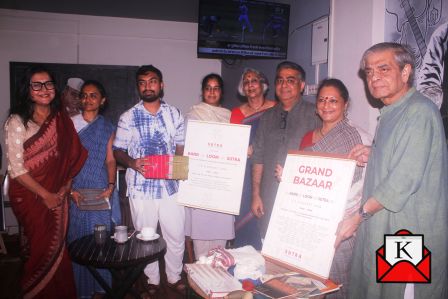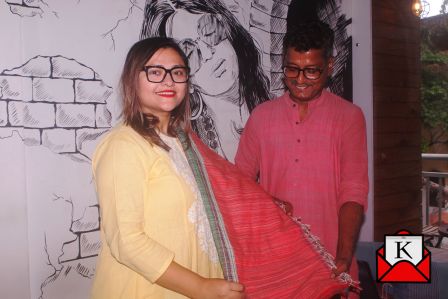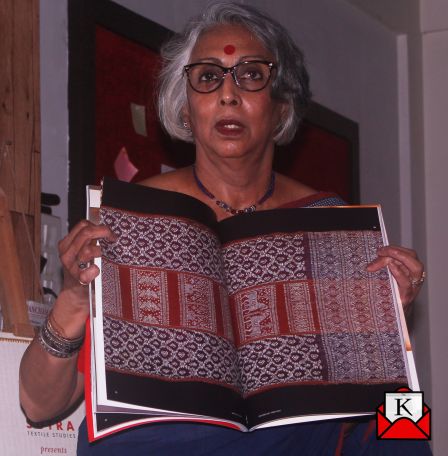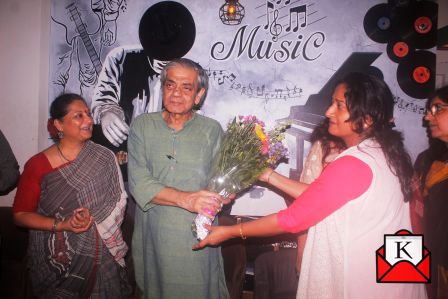Hand Loom Sutra-An Excellent Event Focusing On Indian Handlooms


India is known for its handwoven textiles, which are legendary and embody decades of artistic skill, cultural legacy, and tradition that have been passed down through the years. With their elaborate patterns and striking colors, each item tells a different narrative. With this in mind, SUTRA TEXTILE STUDIES recently launched the upcoming event “HAND LOOM SUTRA” and had a special conversation on “HANDCRAFTED TEXTILES – NOW AND IN THE FUTURE”. This event explores the future of handcrafted textiles in India, taking into account the significant problems that these time-honored crafts face, while also celebrating its rich past and dynamic progress.
The discussion was graced by Sandip Ray, noted filmmaker and Patron, past President of SUTRA TEXTILE STUDIES, Koneenica Banerjee, Popular Actress, Shabri Wable, clothes maker & Curator of TAANT Exhibition, Bappaditya Biswas, Partner, Bai Lou & Byloom, Suchismita Dasgupta, Textiles & Costume Designer, Lolita Ray, Sutra Committee Member, Joyce Johar, Sutra Committee Member & Educationist, Sonali Basu, Textile and Crafts Revivalist and Vishal Saha, Textile Researcher and other dignitaries.

Joyce Johar, Sutra Textile Studies Committee Member & Educationist, said “Handmade textiles are an art form that should be recognized and preserved, and they are a tribute to our rich cultural heritage. It is important to keep in mind that every item woven on a handloom embodies the spirit of our forefathers and the painstaking labor of experienced artisans, especially in the face of quick fashion. In addition to being a gesture of gratitude, promoting and enjoying these textiles is a commitment to preserving a treasured custom for the next generations”.
For centuries, Bengal’s exquisite textiles have been valued domestically and internationally, and no other place in the world can match the expertise of its weavers. Nonetheless, the sector faces several difficulties. Power looms are displacing handlooms in Bengal, where skilled weavers are leaving their looms for better-paying positions. Thousands of people are losing their jobs and means of subsistence as a result of strong machinery misrepresenting handloom textiles as powerloom goods. Natural cotton and silk are being replaced by synthetic fibers, and the number of ancillary workers in the handloom sector is dropping alarmingly. The sector is at a turning point.
Positive developments exist despite these obstacles. The handloom sector requires a lot of labor, and its expansion is fueled by India’s youthful labor force. Women are also heavily involved in the sector, particularly as allied workers. Devoted businesspeople collaborate with Bengali handlooms to produce beautiful textiles. These fabrics are exported to Europe, the USA, Japan, and other countries, and they are highly valued throughout India. This suggests that handloom is still relevant and growing in some areas.
The three-day Hand Loom Sutra event, organized by Sutra Textile Studies, will feature talks, including one started by MARG magazine, a bazaar, a handloom stroll, and an exhibition honoring the rich heritage of Indian handlooms.

The event will be held from August 7 to 9, 2024, from 11 a.m. to 8 p.m., at the ICCR Kolkata, Ho Chi Minh Sarani. A lovely assortment of products from Indian designers and weavers will be on display at this lively exhibition, with a focus on handlooms from Bengal and other locations.
Insightful lectures, a large bazaar, a weavers’ marketplace, live weaving demonstrations, and a fashion walk showcasing exquisite handloom masterpieces will all be available to attendees. Handloom Sutra provides a special opportunity to discover, purchase, and enjoy the elaborate craft of handloom weaving while helping our weavers and other gifted designers and artisans.
Priyanka Dutta
